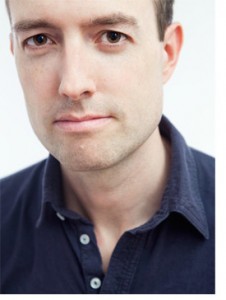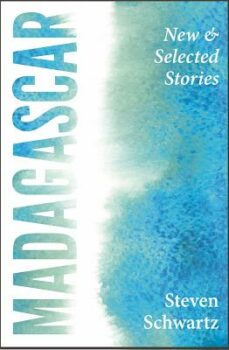Between September of 2008 and February of 2010, our financial system experienced a meltdown that had been set in motion by years of deregulation and corporate delinquency. The strange thing? Unregulated trading, unethical banking, the prospect of a massive economic collapse—all grace the pages of Adam Haslett’s debut novel Union Atlantic, which, as the crisis was unfolding, was being edited, designed, bound, and shipped to bookstores by Nan A. Talese/ Doubleday, which now had a novel of eerie prescience to deliver to the world.
Though perhaps “eerie” is the wrong word. After all, when you talk to Haslett, you learn that he is a political news junkie, someone deeply interested in and attuned to the economic and social forces that shape our lives—someone who links to “Talking Points Memo” on his website. He’s also fascinated by what he calls “the psychology of power,” and speaks of his time at Yale Law School (which he attended after the Iowa Writer’s Workshop and before writing the novel) as an immersion in the language of power. Knowing all this, Union Atlantic starts to seem less an uncanny foretelling and more the reflection of a writer who’s simply been paying attention.
The glimpse into market forces is just one dimension of Haslett’s novel, the heart of which is the conflict between Doug Fanning—a young, ambitious senior manager at Union Atlantic bank—and Charlotte Graves, a retired history teacher on whose family’s Massachusetts land Doug has built an ostentatious mansion. Charlotte believes her two dogs have begun talking to her—one in the voice of Cotton Mather, the other channeling Malcolm X—and admirers of Haslett’s celebrated 2002 short story collection, You Are Not a Stranger Here, will recognize the empathy with which Haslett draws this solitary character, whose mind sometimes utterly distorts reality and sometimes grants her extraordinarily sharp perceptions of it. Rounding out the central characters are Nate Fuller, a high school student who becomes infatuated with Doug while being tutored by Charlotte, and Henry Graves, Charlotte’s brother, the president of the New York Federal Reserve.
You Are Not a Stranger Here was a finalist for a Pulitzer Prize and a National Book Award and has been translated into fifteen languages. The winner of the PEN/Malamud award in 2006, Haslett has published fiction and essays in such places as The New Yorker, The Nation, The Atlantic Monthly, Zoetrope All-Story, The Barcelona Review, Best American Short Stories, The O’Henry Prize Stories, and National Public Radio’s Selected Shorts. We sat down to talk when he visited the University of Michigan as part of the Zell Visiting Writers Series.
Interview:
Kate Levin: I’m excited to talk about your new novel, but first, take us back to the beginning of your writing life. What were your earliest stories like?
Adam Haslett: I started writing short stories when I was in college. The first short story I ever wrote was about a mother, in a house, on her own, getting progressively drunker as the day went on, while her husband was at the office. It was called “1952,” and the story ends with the woman going to visit her neighbor—because she’s just sort of alone—and the neighbor is an old lady, and the woman finds her dead. So, you know, it was a bright start. [Laughter.]
I think fundamentally I started out, and remain, a Romantic in the capital “R” sense of the word. There are emotional states that I have experienced, or that I intuit, or that I have imaginatively experienced, and I want to communicate those experiences. And often, particularly in my first book, those are states of extremis.
I’ve always begun with people alone. My characters always begin with themselves, and so first it’s the relationship of the characters to themselves—that constant unending narration we have in our heads—and then they move into the world. And I want to track how they continue to relate to themselves once they encounter the world.
Before getting your MFA, you’d spent a year as a fellow at the Provincetown Fine Arts Work Center. Did you arrive at the Iowa Writers’ Workshop, then, with a bunch of stories and a clear idea of what you wanted to work on there?

Provincetown, at the Fine Arts Work Center
No. Other than to keep writing, no. I spent most of my time at Provincetown writing one story, “War’s End,” which is in the book. At Provincetown I had the privilege of a year, full-time, no distractions, no domestic stuff, no classes, no job, nothing, so that’s when I became what I think of as sort of a professional writer, you know—every day, I wrote.
So you went from writing alone in your room in Provincetown to being a student at Iowa. Was that the first time you’d had lots of readers’ eyes on your work, and what was the experience like for you?
Well, I took one writing class in college, which functioned in a workshop style, so I wasn’t entirely new to it, but certainly it was more intense. I think if anything I was leery. I should back up and say that I went in with very low expectations—I went expecting nothing except time to write, and if I were to get anything from a workshop, or a teacher, then that would be gravy. That was my own understanding of what I was doing. So in that sense, I think it was easier to have a good experience, because it turns out I was there with some good people and had some good teachers.
One last MFA-related question before we leave that world: I noticed that your new novel’s main character, banker Doug Fanning, has a young secretary who’s described as feeling powerless because she has “an advanced degree in short fiction.” I hadn’t realized until then that she was supposed to be a former MFA student! Was that a little bit of gentle derision on your part, or a wink and a nod to those of us MFA-ers who might be reading?
[Laughter.] It was sort of a wink and a nod. It’s also from Doug’s point of view—and Doug thinks of himself, because of the control he has at the bank, as what he calls “an artist of the consequential world,” not the “observer of effete emotion” that Sabrina Svetz wants to be. So that’s Doug making a distinction between art and the world, which is certainly more pejoratively drawn than I would draw it.
Your story collection, You Are Not A Stranger Here, was published in 2002. You’ve said in an earlier interview that you begin a short story by hearing a voice or catching hold of a certain sentence rhythm. Do you summon a voice or a rhythm when you’re sitting down at your desk? In other words, do you write your way into a certain voice? Or do you hear it first and then try to nail it down with words?
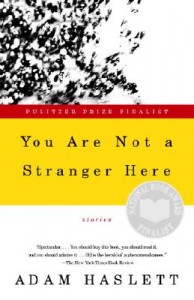 It’s more the former. The reason you have to spend so long at your desk is because you need to be there when it happens. It’s nice to think that you’d walk down the street and something would come to you whole cloth, but it doesn’t happen much. It has to do with a certain calming of the mind, quieting the voices of distraction. I meditate every morning before I work, and that’s a process of getting rid of a lot of the things that block out those quieter, subtler voices in your own mind. So, I don’t know if I can say that I can summon those voices, but maybe I can hear them better. It’s sort of a negative skill, the skill of concentration. It’s the skill—increasingly difficult, it seems to me—of blocking out a manic culture, in order to be able to listen to something that, when you first hear it, is a wisp of a nothing of an echo. And if it’s ever going to have life, you have to pay attention to it, take it seriously, let it be more important than other things that are way more produced and slick and loud.
It’s more the former. The reason you have to spend so long at your desk is because you need to be there when it happens. It’s nice to think that you’d walk down the street and something would come to you whole cloth, but it doesn’t happen much. It has to do with a certain calming of the mind, quieting the voices of distraction. I meditate every morning before I work, and that’s a process of getting rid of a lot of the things that block out those quieter, subtler voices in your own mind. So, I don’t know if I can say that I can summon those voices, but maybe I can hear them better. It’s sort of a negative skill, the skill of concentration. It’s the skill—increasingly difficult, it seems to me—of blocking out a manic culture, in order to be able to listen to something that, when you first hear it, is a wisp of a nothing of an echo. And if it’s ever going to have life, you have to pay attention to it, take it seriously, let it be more important than other things that are way more produced and slick and loud.
To dive into the collection itself, the two opening stories, “Notes to My Biographer” and “The Good Doctor,” seem to have an interesting inversion to them. In the first, the narrator, an aging inventor in the middle of a manic episode, rails against “the mental health establishment” and appears to be off his meds. The second story is told from the point of view of a psychiatrist who tries to engage a reclusive patient in talk therapy, only to find that the woman just wants to take her meds. Now, I could be reading far too deeply into it, but did you put these stories side by side to show us the two sides of that “mental health establishment,” patient and practitioner?
No, the only factors that went into the sequencing of the stories were that there were certain stories I wanted to keep away from each other, so that dictated where they would go. I was aware, also, that half were set in England and half in America, so I was doing a little bit of variation of that.
Ah, so much for my theory. So, while the subject of mental illness isn’t the only thing that unifies the collection—there’s also the solitude of the characters, for one—it’s certainly present in a number of the stories. When did that theme make itself apparent to you? Or did you just think of yourself as writing isolated stories, with some outside readers then pointing out, hey, you could cohere your collection around this theme?
Well, it was certainly something that came from outside. First of all, I didn’t think of myself as writing a collection, until I signed a contract for it. So, definitely, I thought of them as individual stories about individual characters—and they’d been written over four years. I didn’t really think of them as having shared themes in particular, so it did take readers, critics… “mental illness” was sort of the headline of the New York Times review, so it traveled under that banner.
Interesting—how did you feel about that “banner” being placed over the book?
Well, that’s complicated… there’s a lot of things to be said. On the one hand, there’s the real biological fact of mental illness, but I also think that phrase is a kind of conceptual suitcase that people can keep closed. And once you open it, you find out that it’s a label for a variety of human experiences that many of us have the edges of, and these lines aren’t so easy to draw. So the phrase itself rarely appears in the collection. I’ve said before that if I’d set the same characters a hundred years earlier, they would have simply been considered eccentrics. That I’m writing about people whose experience is, in this day and age, seen through the lens of psychiatry, says as much about the culture as it does about those people.
In between writing your collection and your novel, you went to law school at Yale. Was that based at all on a desire to have an occupational footing in the “consequential world,” as your character Doug thinks of it?
Yeah, sure. There’s something fascinating and appealing and alluring to me about the psychology of power, and particularly the psychology of anonymous power. And so going to law school was in a sense like learning a language. Law is the language of power in this country, probably more than in any other country in the world. So that was interesting, but I think the exercise of it—the work—is just too boring. Do you know what I mean? So I don’t know that I could ever sustain the interest to try to be a powerful person. I don’t think that’s what I’m interested in, power of that particular kind. But it’s allowed me to be a fly on the wall in a lot of places where I otherwise wouldn’t have been.
Did you write fiction while you were there?
Well, the way it worked was I went from Iowa to there, and then I signed the contract for the book [You Are Not A Stranger Here] in the spring of my first year, and then I took the next year off to finish the book. And then I went back to finish law school, and the book came out the last year I was there. When I was actually attending classes in law school, I would say I did more editing than actual drafting, but that was just a question of time.
I’m curious about how you taught yourself to write a novel. Did you read a bunch of novels and kind of try to learn by diffusion, or did you just let yourself write your way into problems and write your way out?
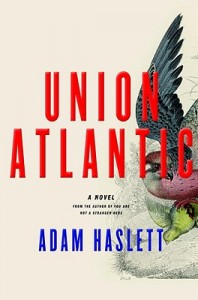 I think it was more the latter. I mean, I had a guiding overarching ambition as a writer—not particularly for this book, but just as a writer—which had to do with the two things I’ve loved most in my reading, over the years: the sense of social scope in the nineteenth-century novel, and the psychological intensity of Modernist fiction—Faulkner and Woolf and Proust. And I didn’t want to sacrifice one to the other, or have only one or the other. I wanted social scope and I wanted interior intensity. So my ambition was to try to get both of those things into the book. I started with characters, but some of them were characters that were already in a place, in a world, that was demanding their attention. In a sense, the conjuring act happened right away—I mean, if you choose to write about the head of the New York Fed, it’s not going to be a quiet domestic novel.
I think it was more the latter. I mean, I had a guiding overarching ambition as a writer—not particularly for this book, but just as a writer—which had to do with the two things I’ve loved most in my reading, over the years: the sense of social scope in the nineteenth-century novel, and the psychological intensity of Modernist fiction—Faulkner and Woolf and Proust. And I didn’t want to sacrifice one to the other, or have only one or the other. I wanted social scope and I wanted interior intensity. So my ambition was to try to get both of those things into the book. I started with characters, but some of them were characters that were already in a place, in a world, that was demanding their attention. In a sense, the conjuring act happened right away—I mean, if you choose to write about the head of the New York Fed, it’s not going to be a quiet domestic novel.
One of the things that struck me about Union Atlantic is just how much “world” you give us. There was a piece by the literary critic Walter Benn Michaels in the last year or so arguing that literary novels should be more like “The Wire”—so, avoid locking us in a room with two people and telling us about their relationship, and instead give us more social context, more political context. First of all, I don’t know if you’re into The Wire—
Sure, sure, I love The Wire.
Me too. So, as a novelist, what’s your take on what Michaels is saying?
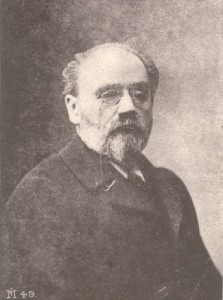
Emile Zola (1840-1902)
I mean, Tom Wolfe twenty years ago wrote an essay in Harper’s that was basically saying that writers should be more like reporters. I think this is a theme that goes all the way back to Zola and naturalism and writing that is a kind of reportage as opposed to just the marriage plot. I mean, at that point, everything was in the realist vein. Zola is someone who was fascinated by—the way The Wire is—social strata. In The Wire, you know by what kind of car they drive where they fit into the Baltimore world, and one of the things I love about reading Zola is, like, one of the first things you learn about someone is how much they earn. Not because he thinks it’s the deepest thing, but because he knows how close to the surface that is in everybody’s understanding of how people fit in. So, yeah, that’s the curious outward-looking part of me that wants to have that—and also, just as someone who reads a lot about politics every day in the news, and thinks about it a lot, and gets worked up about it a lot, it is frustrating to read so much contemporary fiction that has essentially lobotomized what is an omnipresent, 24-7 flux of stuff that’s coming at us. So, unless that’s sort of justified, it’s beginning to border on the inexcusable. It’s an incomplete rendering of our experience.
Now, you can write historical fiction, which I, you know [laughter], shouldn’t say too much about—but you can write historical fiction and obviate these problems, right? You can write a novel set in the nineteenth-century, or the middle of the nineteenth-century, and you can write a marriage plot, and generate all your drama in the conventional manner that has been for two hundred years. But obviously, you know, that’s not my project.
You mentioned that you’ve written some short stories since completing the novel.
Not many, but yeah.
Is that sense of “the world” more a part of the picture in your short fiction now that you’ve had the experience of writing this socially-minded novel?
Well, it’s interesting, because the last short story I wrote was a short story in which the main character is Obama, so, that’s in “the world.” [Laughter.] He’s dealing with a lot. And that came about because an editor said, “Look, do you want to do this?” I didn’t just sit there and say, “Oh, I think I’ll write about Obama.” But it was interesting, and I enjoyed it. The short answer is, I don’t know the answer, because other than that one project I haven’t really gone back to writing short fiction and thinking about it. I think the point is that if you want to show relationships between micro and macro systems, or experience, it’s very hard to do that in the form of one character, because very few people, given the breadth of—how low the low are, how high the high—the gaps in income and privilege and power that we live with, it’s very hard to put that in one story.
Right. That makes a lot of sense. So, let’s dive more deeply into the novel, starting with Doug, the banker. I was surprised to see that the novel opens with a scene of military combat in 1988, when Doug’s a naval officer on a ship called the Vincennes, in the Persian Gulf. The present of the novel takes place in the run-up to the Iraq War. Which aspect of the character came first—his military identity or identity as a finance guy? How did you build this character?
Well, I thought at the beginning that Henry [Graves, the president of the New York Federal Reserve in the novel] would have an opposite number at the bank, Union Atlantic, in Jeffrey Holland, the head of the bank. But I found him to be a little dull on the inside. So, I was writing a scene of Jeffrey Holland, and Doug kind of came in as the second-in-command and he just seemed more…I was just more interested in that figure. So that’s how he began, and that’s how I started writing more about him. I’m trying to remember the first scenes I wrote of Doug… I can say that I wrote the Vincennes scene in the Persian Gulf not at all clear if it would be in the novel, because, you know, it could easily not be, and it wasn’t clear to me that it was Doug, but it became so. I guess it was understanding him in office life that was what first gave me a way in to Doug. There’s a whole culture, or a hierarchy and a balancing act, with all these different actors in the building, and he’s got a relationship with all these different people and is controlling information.
In that opening Vincennes scene, we witness Doug committing a highly immoral act, and at that point I thought, well this is a character we’re just going to indict—but actually he becomes much more inflected over the course of the novel. We learn about his class background, his mother’s alcoholism. Can you talk about these elements—when they developed, and how important they are to Doug’s characterization and to the book itself?
Well, that was pretty early on. That Finden (the town) represents something very particular to him—that I knew early on. There’s a “fuck you” contained in the act of building this house, and it is heard by his neighbor. So, that sense of resentment of the privilege in which he now takes part was key to this kind of anger. He’s an angry guy, and… how should I put it… both the worlds that he’s operated in—the military and the financial world—if there’s an emotion that vivifies those worlds, I would say it’s a certain kind of male anger. It’s more obvious in the military, it’s more abstracted in finance, but it is powerful. And we have been living with its consequences for a long time. And we still are. I didn’t realize this until later, in writing Doug—I didn’t realize that that’s what I was getting at, why it was important to have the military and the finance stuff together. Not together, like, we see the systems operating together, but through an individual, who participates in both cultures.
Besides Doug, there are three other central figures in the novel: Charlotte, Henry, and Nate. In a recent interview, you were asked which of these four characters you identify with most, and you’d said that in creating each of these characters, you had to expose a part of yourself. I’m really interested in that idea, and wonder if you could say a little more about it.
I think it’s a messy, kind of always-in-process… process. [Laughter.] I don’t think you can write about a character for a long period of time if they don’t interest you, and the interest comes from them being both different, and yet preoccupied by, bothered by, rankled by things that bother, preoccupy, and rankle you. So, in a sense, I always find myself most comfortable writing about someone, or sets of events, that are thirty degrees off from my own experience. Enough to be able to freely—and without trying be true to my life or anybody else’s—import things that are of interest to me. It’s not autobiography, nor is it biography of character. I think it’s like letting those quieter voices that we were talking about earlier get louder so that you realize that a character is headed in a certain direction, and then the brave thing is to let go and let them be something that might be shameful to yourself. I think shame is actually pretty heavily involved in the process.
Confronting one’s own shame?
Yeah. Writing about people wanting things that you find shameful to want. And even if you know you’re writing about a character, the book’s going to have your name on it, which is a good thing—if no serious internal trouble has been overcome in the writing of a book, then there’s not a lot of blood on the floor, and it’s not as interesting to me.
You finished your book the week Lehman Brothers collapsed. How did it feel to you, when the economy actually tanked, to know that you’d just finished a book that very wonderfully delineates—for people who don’t know how banks engorge themselves, and skirt regulations—how a collapse like that could happen?

Federal Reserve Bank of New York: Image from Wikimedia Commons (photo credit: Dmadeo)
It was disorienting, because I’d spent so long thinking and worrying over what level of detail to go into on these subjects in the book itself, and wondering if anybody would even care about the Fed or banks. It was disorienting, because it was such an outsized event for everybody, and yet for me, when I started reading about meetings of bankers at the New York Fed, I was like, oh yeah, I wrote that scene about a year and a half ago. So that was uncanny. And I suppose, selfishly, the concern was that the book would be—I mean, I knew that it was inevitably going to be read in light of that. It just can’t not be. But my only worry was that that would somehow overweight the financial aspects of the book at the cost of the rest of the things that are going on, whereas what had led me into the Fed in the first instance was not banking or finance per se, but a way that we’ve chosen to govern ourselves, which is the tyranny of abstraction in economics as a natural science, which is so much bigger than the Fed.
You’ve said that you started working in the novel after reading a book about the Fed. I was wondering what other kinds of research you did for the book, particularly of the non-reading kind. Did you gain access to the corridors of power?
I did not go and visit investment banks. I did visit the New York Fed—I was an associate at a law firm where a guy there used to work for the Fed, so I was able to go into the New York Fed. Now I currently have a friend who’s a lawyer there, so I’ve been into the gold vault, and I’ve seen the boardroom, I’ve seen the building, so that was all very helpful. And I met with a recently retired Fed official about some of the mechanics. But most of it was reading. Other than some scene setting, ninety percent of it was reading.
A character like Jeffrey Holland, say, who you said you’d imagined early on as a central character—there’s something about the way you describe his bearing, his physical presence, that made me think you’d done some careful observing of powerful people.
I was thinking of Bill Clinton. I was thinking of the large, seductive, sharp, smart, garrulous, kind of winner, and all that that comes with. I mean, he’s not as smart as Clinton, but, yeah.
Do you have a second novel in the works?
I have ideas, I have characters, I have some very preliminary sketches, but I also have a desire to approach it differently, and quite possibly write some of it in the first person.
Besides trying out the first person, how else are you thinking of approaching this second novel differently? Will you outline or map it out?
Well, you know, I’m not an outliner. And I didn’t know a lot about the plot of this book until it developed as I went along. I don’t know whether it’s so much an outline as wanting to know—which maybe I can’t, and it’s just a fantasy—what the central tensions of the book really are, so that one can move to the starting point of that tension. As opposed to the 200 pages of work where you’re like, oh, it’s about that, at which point you then start again.
Further Links and Resources:
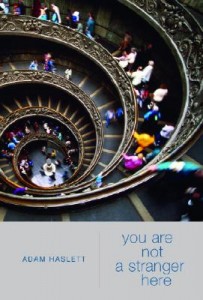
- For more about Adam Haslett’s work, or to find links to his recent writing, interviews, and features, please visit the author’s website.
- Check out “Night Walk,” Haslett’s most recently published short story, featuring protagonist Barack Obama.
- Or read Haslett’s story “Notes to my Biographer,” published in 1999 in Vol. 3, Issue 3 of Zoetrope: All Story.
- You can also read “The Beginnings of Grief,” which appeared in 2002 in Issue 32 of The Barcelona Review.

